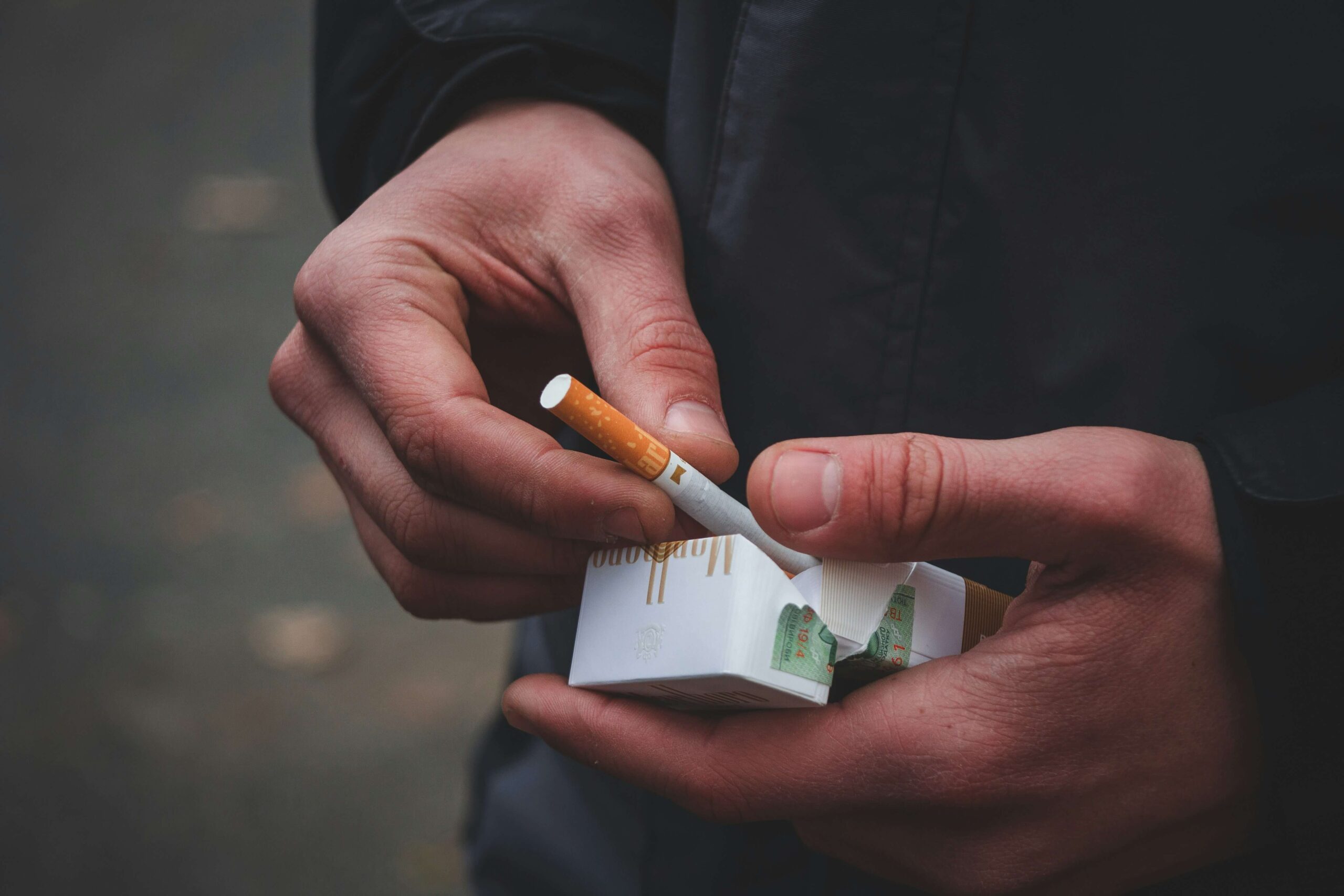Nicotine withdrawal timeline – Quit vaping & smoking timeline
How long does nicotine withdrawal last? Discover Allen Carr’s timeline guide to quitting nicotine and find effective strategies to break your addiction.

What’s stopping you?
Not sure if you’re ready to stop smoking? Worried about finding it difficult?
Start quizWhen you stop taking nicotine whether through smoking cigarettes or vaping you will suffer withdrawal as with any drug.
This page explains why, what you can expect and how bad smoking or vaping withdrawal or more correctly nicotine withdrawal will be.
The effects of quitting nicotine are dramatic and begin the moment you stub out your final cigarette or put down your vape.
Taking a look at the smoking withdrawal timeline and health benefits of quitting smoking aren’t always an effective motivating factor to help someone quit smoking – but they are fabulous factors to enjoy and celebrate once you become free from nicotine addiction.
- Nicotine withdrawal timeline
- Stages of withdrawl
- The physical symptoms
- The mental symptoms
- Withdrawl – day by day
- How is nicotine absorbed into the body?
- What is nicotine withdrawal?
- Nicotine withdrawal symptoms
- When does nicotine withdrawal start?
- How long does nicotine withdrawal last?
- What’s holding you back? Take our quiz
- Free videos and articles
- Other useful stop smoking articles & news
Smoking & Nicotine Withdrawal Timeline
Many believe that smoking, vaping, tobacco or nicotine withdrawal is a difficult and unpleasant stage of quitting, that there will be nicotine headaches and clear signs of nicotine withdrawal such as mood swings, difficulty concentrating and anxiety. This belief would create a tremendous fear of quitting smoking and vaping for anyone, but withdrawal is not as bad as people fear.
You may be surprised that nicotine addiction is 1% physical and 99% mental.
The reality is that smokers & vapers go into withdrawal whenever they put out a cigarette or put down a vape. They sleep through physical nicotine withdrawal every night when they go to sleep but it’s so mild that it doesn’t even wake them up!
It is the mental addiction that causes the physical feelings and these are caused by the process a smoker/vaper has gone through whilst becoming addicted. These may include that smoking/vaping helps the smoker/vaper to relax, cope with stress, socialise, concentrate and focus, enjoy drinking or enjoying a meal, and even after sex. It is this belief that has a smoker/vaper who is using willpower to quit experience awful panic, anxiety, upset, and irritability.
As a person goes through the various stages of quitting smoking or vaping using willpower – the symptoms get worse and worse and include all of the above, as well as sleeplessness, and a feeling of doom and gloom.
The great news is that Allen Carr’s Easyway method ensures that the former smoker/vaper doesn’t suffer any of those negative signs of nicotine withdrawal.
In fact, the physical effects of quitting nicotine are entirely positive, as are the mental ones, as long as you use the right method to quit.
Stages of nicotine withdrawal
When do physical symptoms stop and what is the symptoms timeline?
| Time | Effect |
| Once the cigarette is put out/ Vape put down | A very mild, slightly empty, insecure feeling but so mild you sleep through it every night |
| 2 hours | 50% nicotine free |
| 6 hours | 97% nicotine free |
| 24-48 hours | Nicotine free |
When do mental symptoms stop
| Time | Allen Carr’s Easyway | Willpower |
| Immediate | No withdrawal – no feeling of deprivation or loss so no mental feelings | Feeling of loss and deprivation |
| 4-24 hours | No withdrawal – no feeling of deprivation or loss so no mental feelings | Increased feelings of deprivation leading to: Craving for nicotine Irritability Frustration Low mood Difficulty concentrating Anxiety Mood swings Headaches Difficulty sleeping |
| Day 3 | No withdrawal – no feeling of deprivation or loss so no mental feelings
After only 72 hours of stopping smoking you should notice an improvement in your energy levels. |
Peak withdrawal symptoms for average quitter |
| Years | No withdrawal – no feeling of deprivation or loss so no mental feelings | Feelings may continue because the mental aspect of loss and deprivation has not been dealt with. |
To overcome your fear of withdrawal, you need the facts, not the fiction. Get the facts about nicotine withdrawal (trust us, you’ll be pleasantly surprised) and quit easily with Allen Carr’s Easyway
The table below will take you through what happens when you quit smoking in a simple timeline.
What happens to the body when you quit smoking day by day timeline
| Period | Effect |
| Immediately. | Freedom and no desire to smoke or take substitutes like gum or vaping providing you quit with Allen Carr’s Easyway You are no longer controlled by a drug and don’t have to suffer the mood swings, stress, and pressure of having to constantly top up nicotine to stave off nicotine withdrawal. |
| 20 mins | Heart rate and blood pressure drop closer to normal. This helps reduce levels of stress and danger of stroke and heart attack.
Hands and feet will also warm up to their usual temperature as a result of improved circulation. Socialising with smokers is as fun as normal with no envy or fear of smoking again providing you quit with Allen Carr’s Easyway |
| 2 – 12 hours | Carbon monoxide level in your blood drops to normal meaning vital organs, such as the brain, nervous tissues and the heart, begin to receive the correct levels of oxygen, and no longer starved of oxygen, they begin to work properly.
Nicotine in your blood has halved. Muscles and brain function is better because the correct level of oxygen is now in the blood stream. Unpleasant nicotine withdrawal / cravings occur when quitting with many methods but not with Allen Carr’s Easyway. In fact the withdrawal process becomes a pleasant experience. It is easy to stop smoking when you know how. |
| 24 – 48 hours | Heart attack risk reduces. If you smoke a pack a day you are twice as likely to have an attack than a non-smoker but after a day smoke free this already reduces significantly.
Smell and taste improve because the nerve endings begin to regrow and return to normal function. Lungs will be cleaning removing the junk left from cigarettes & vapes. Sometimes this manifests itself as a cough – but don’t worry – it’s all part of your body healing itself and getting rid of the junk that’s built up in your lungs. Asthma can get worse as the lungs clean but it is temporary and easily managed. Many asthmatics become able to get rid of their asthma pumps when they quit smoking – such is the improvement in lung function. Nicotine is no longer in your body. |
| 5-10 days |
What happens after 5 days of not smoking?Cravings – these will decrease significantly and with the Allen Carr’s Easyway method you feel no sense of deprivation and so these feel insignificant. Success – Smokers who make it to one week without smoking are statistically nine times more likely to successfully quit. |
| 2 Weeks to 3 Months | Heart attack risk reduces further
How long does it take for your lungs to fully recover from smoking?Between 2 weeks to 3 months after quitting smoking, lung capacity and performance will regenerate and according to the American Heart Association enable intense activities such as running |
| 1 to 9 Months | Coughing will no longer be a hacking
Shortness of breath will decrease Energy will increase Illness will decrease such as having fewer colds |
| 1 Year | Heart attack risk drops to half that of a smoker |
| 5 Years | Heart attack risk is now that of a non-smoker
Cervical cancer risk is now that of a non-smoker Mouth, throat, oesophagus and bladder cancer risk is now half |
| 10 Years | Lung Cancer risk is now half that of a smoker
Mouth, throat, esophagus, bladder, kidney, larynx and pancreas cancerr risk drop |
| 15 Years | Heart disease risk is now that of a non-smoker |
How is nicotine absorbed into the body?
When tobacco smoke or vapour is inhaled, nicotine is absorbed through the wall lining of the lungs. When sniffed or chewed it is absorbed through the nose or mouth. It is also possible to absorb it through the skin.
However it is absorbed, it enters the bloodstream and circulates around the body to the brain. When smoked it reaches the brain in about seven seconds1.
What does nicotine withdrawal feel like?
Nicotine Withdrawal Symptoms can be broken into two different categories. You might assume that those would be physical and psychological, but in fact all the really unpleasant symptoms that smokers experience when they quit are caused by a mental process, rather than the physical withdrawal from nicotine.
The mental process is triggered by physical withdrawal, but that withdrawal is so slight – it’s almost imperceptible.
Side Effects of Nicotine Withdrawal
The actual physical withdrawal from nicotine is a very mild, slightly empty, insecure feeling. It’s so mild that most smokers don’t even notice it throughout their smoking lives.
The physical feelings that the slight feeling of withdrawal trigger are caused by the process a smoker has gone through whilst becoming addicted. They believe that smoking helps them to relax, cope with stress, socialise, concentrate and focus, enjoy drinking or enjoying a meal, and even after sex. It is this belief that has a smoker who is using willpower to quit experience awful panic, anxiety, upset, and irritability.
As a smoker goes through the various stages of quitting nicotine using willpower – the symptoms get worse and worse and include all of the above, as well as sleeplessness, and a feeling of doom and gloom.
The great news is that Allen Carr’s Easyway to Stop Smoking method ensures that the former smoker doesn’t suffer any of those negative signs of nicotine withdrawal. In fact, the physical effects of quitting nicotine are entirely positive, as are the mental ones, as long as you use the right method to quit.
Most smokers, even really heavy ones, don’t even experience so much as a nicotine headache.
The stages of nicotine withdrawal cease to be a minefield or obstacle course and instead become like a walk in the park.
Tobacco withdrawal, even for chain-smokers or chain-vapers, really isn’t a problem as long as you know how to stop smoking without feeling deprived.
What’s holding you back?
Not sure if you really want to quit smoking?
Want to stop, but concerned that you’ll find it tough?
Worried that you’ll be deprived for the rest of your life without cigarettes?
We know that taking the first step can be difficult, but we’re here to answer your questions in complete confidence – with no pressure and no judgement.
We have trained advisors available to help you right away, by calling 0800 389 2115
Start the free quizWhen does nicotine withdrawal start?
Nicotine is a drug and whatever method you use to take it whether smoking or vaping you will experience withdrawal.
Cigarette withdrawal or more accurately nicotine withdrawal begins as soon as a cigarette is extinguished, nicotine starts to withdraw from the body and the smoker can experience physical and mental symptoms.
Nicotine withdrawal is the result of the first ever cigarette a nicotine addict smoked.
It is momentarily “relieved” by the next cigarette.
The brain concludes, non-consciously, “next time you feel nicotine withdrawal – do that again!”.
In other words, the behaviour of lighting a cigarette in response to experiencing nicotine withdrawal is reinforced every time a smoker lights a cigarette or has a vape regardless of the fact that the next cigarette or vape will also cause nicotine withdrawal.
How long does nicotine withdrawal last?
How long does it take for your body to stop craving nicotine?
Most of the nicotine leaves the body over the following 48 hours until, after a maximum of 3 weeks there are no traces left.
This is why the first few days after quitting smoking can be among the toughest when the cravings first begin and can be most intense. However, with Allen Carr’s Easyway this should not be the case because there is no sense of loss or feeling that you are giving up something that you really want and need.
Physiological withdrawal
Whether a smoker is in a happy situation, a concentration situation, a sad situation, a stress situation, a relaxing situation, a boring situation, or a lonely situation they simultaneously experience nicotine withdrawal, and respond by lighting a cigarette or having a vape, thereby immediately feeling better than a moment before and oblivious to the fact that that cigarette or vape will perpetuate nicotine withdrawal once it is smoked or vaped.
It’s no wonder they think nicotine helps them to be happy or to concentrate, or to cope with sadness and stress, and to help them relax or cope with boredom or loneliness! It’s got nothing to do with genuine pleasure or genuine improvement of mood. And every single time they light a cigarette in one of those situations – the brain concludes, non-consciously, “next time that happens – do that again!” hence the craving.
Non-smokers don’t have to deal with any of the mental and physical aggravation of being addicted to nicotine. They don’t suffer nicotine poisoning, nicotine withdrawal or the aberrational/unnatural impact nicotine has on dopamine and their behaviour.
Reducing withdrawal
All a smoker or vaper is trying to achieve when they light a cigarette or have a vape is to recapture the feeling of peace, calm, tranquillity and completeness they enjoyed their entire lives before they lit their first experimental cigarette or vaped for the first time. In other words – a smoker smokes in order to feel like a non-smoker and a vaper vapes in order to feel like a non-vaper.
Once a nicotine addict understands Allen Carr’s Easyway we explain how nicotine addiction, irrespective of nicotine’s influence on dopamine levels, is actually extremely mild, and that the really unpleasant symptoms a nicotine addict suffers when they try to quit without Easyway’s help, are the result of a mental struggle. That struggle or craving is caused by the nicotine addict feeling deprived of what they think is a genuine pleasure or crutch.
Easyway goes on to reveal how the nicotine addict’s belief system surrounding the drug, that it helps them to relax, socialize, handle stress, concentrate, enjoy alcohol, take a break from work, and so on, is illusory and based on misinformation, misinterpretation of personal experiences, and their addiction to nicotine.
The smoker then concludes that there aren’t any factual advantages or benefits to be obtained from nicotine and therefore there is no point in doing it. This effectively destroys the belief that they need the drug/smoking/nicotine and simultaneously removes the “want to smoke/vape” which ends/cures/stops/destroys/neutralises the addiction.
This leaves the smoker to handle the extremely mild symptoms of nicotine withdrawal without having to experience the discomfort of feeling that they are missing out on something they used to enjoy or receive benefit from.
This is hugely important as the former smoker develops new responses to any habitual triggers to smoke over the first few weeks of being a happy non-smoker. For example, if they used to light a cigarette as they left work in the afternoon, that might be a moment when the thought of smoking crosses their mind, but once they quit with Easyway, instead of consciously processing thoughts and feelings of loss, they process thoughts and feelings of release and freedom.
In fact nicotine addiction is at least as addictive as heroin and cocaine as per the US Surgeon General2.
Free Online Quiz












